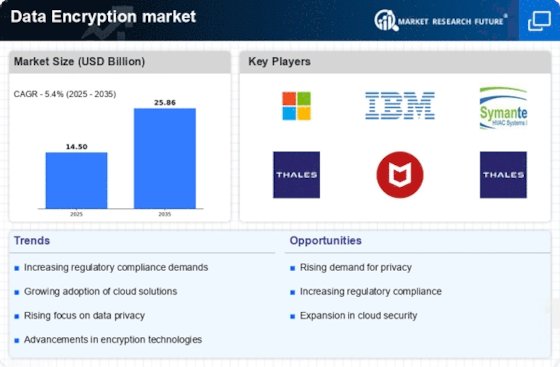Top Industry Leaders in the Data Encryption Market

Competitive Landscape of the Data Encryption Market:
The data encryption market is a booming landscape, fueled by the ever-increasing volume of sensitive data and the constant evolution of cyber threats. Navigating this competitive field requires a clear understanding of the key players, their strategies, and the factors shaping market share dynamics. This analysis delves into the intricate competition for data security supremacy, providing a roadmap for businesses and investors alike.
Key Players:
- Microsoft Corporation (US)
- IBM Corporation (US)
- Symantec Corporation (US)
- Intel Security (US)
- HP (US)
- Oracle Corporation (US)
- Gemalto (The Netherlands)
- Netapp Inc. (US)
- FireEye Inc. (US)
- Vormetric Inc. (US)
Strategies Adopted:
To win market share, these players employ various strategies, including:
- Product differentiation:Focusing on specific encryption needs like cloud security, endpoint protection, or homomorphic encryption (enabling computations on encrypted data).
- Integration and bundling:Offering comprehensive security solutions that integrate encryption with other security tools.
- Partnerships and acquisitions:Collaborating with technology or industry leaders to expand reach and expertise.
- Open-source encryption:Contributing to open-source projects to build community and leverage collective innovation.
- Subscription models:Offering flexible licensing options and recurring revenue streams.
Factors for Market Share Analysis:
Understanding market share distribution hinges on several key factors:
- Target market:Each player focuses on specific sectors like healthcare, finance, or government, influencing their market share within that segment.
- Product portfolio:The breadth and depth of encryption solutions offered impact a player's appeal and reach.
- Brand reputation:Established names with strong brand recognition hold an advantage in attracting clients.
- Pricing strategy:Competitive pricing and flexible models can attract budget-conscious customers.
- Technological innovation:Continuous investment in cutting-edge encryption techniques and compliance with evolving regulations can give a player an edge.
New and Emerging Companies:
The landscape is constantly evolving, with new players entering the market with innovative solutions. Some promising categories include:
- Quantum-resistant encryption:Companies like PQShield and Entrust are developing solutions to counter future threats from quantum computing.
- Data loss prevention (DLP):Start-ups like Tessian and Digital Guardian offer advanced DLP solutions incorporating encryption.
- Blockchain-based encryption:Companies like AnChain and Guardtime are leveraging blockchain technology for secure data storage and access control.
Current Company Investment Trends:
Key investment trends influencing the data encryption market include:
- Cloud-based encryption:Increasing reliance on cloud computing drives demand for cloud-native encryption solutions.
- Artificial intelligence (AI) and machine learning (ML):Integrating AI and ML for threat detection and automated encryption management.
- Zero-trust security:Growing adoption of zero-trust architecture necessitates granular encryption controls.
- Privacy-enhancing technologies (PETs):Techniques like homomorphic encryption and secure multi-party computation (MPC) gain traction for preserving data privacy while enabling analysis.
Latest Company Updates:
December 2023, TechCrunch: Homomorphic encryption is gaining traction as it allows computations on encrypted data without decryption, enhancing privacy and security.
December 2023, NIST: Quantum-resistant cryptography is being developed to protect against potential threats from quantum computers.
October 2023, Gartner: Zero-trust security models are increasingly incorporating data encryption for improved access control and data protection.










